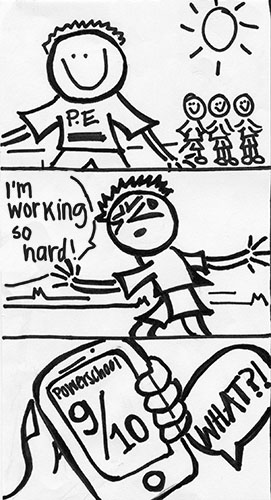New PE policies have right idea, require refinement

illustration by Gigi Cepeda
September 28, 2018
This year, the PE Department decided to change some rules and expectations, specifically concerning dress code and grading. The Oracle’s Editorial Board believes there is room for improvement in both how these changes are communicated to students and how the changes have been implemented.
One major change is how PE teachers are grading students. In past years, students would receive a 10/10 for daily participation by putting effort into class activities. This year, however, the baseline grade is a 9/10, meaning students must go “above and beyond” to receive a 10/10, according to PE Teacher Meaghan Fastert.
Several students on the Editorial Board have noted a lack of consistency between teachers in terms of grading with the new system. Teachers decide who receives a 10/10 based on how they view student effort during the class; however, this policy opens up students’ grades to teachers’ subjectivity.
With the future implementation of heart rate monitors, teachers will more accurately be able to judge student’s efforts, according to PE Teacher Thea Minogue.
“[The heart rate monitors] take away the subjectivity of teacher observation,” Minogue said.
The Editorial Board believes that until use of heart rate monitors becomes widespread, teachers should standardize what constitutes “above and beyond” performance. This could rectify what many students, such as senior Emma Schwartz-Dodeck, believe is unfair.
“I think that expecting us to go above and beyond and giving us the baseline score and no extra credit is like being handed a test and being expected to write your own questions in after the 40 you’ve already answered,” Schwartz- Dodeck said.
However, Fastert says the goal is not to punish students, but to push students to participate in class and reward them for exceptional behavior.
The Editorial Board supports the PE Department’s goal of incentivizing student effort.
However, the new grading system needs increased clarification and refining, as some students are unaware of how to earn a 10/10 or feel unable to do so. A specific rubric is needed to provide students with an understanding of how to earn full credit in class.
Other students, such as senior Stephanie Ornduff, dislike the new grading because constantly receiving 9/10 points leads to ending the semester with a 90 percent after attending every class. This leaves little, if any, room for missing classes while maintaining an A in the course, Ornduff says.
The Editorial Board proposes keeping the baseline grade at a 9.5/10, but offering extra credit for students who go beyond expectations. This would rectify both the attendance issues noted by Ornduff and the sense of frustration noted by Schwartz-Dodek.


